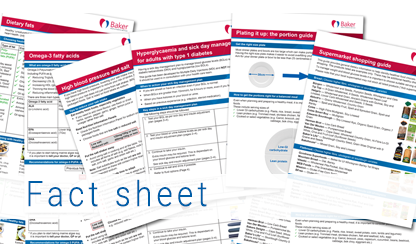We provide specialist treatment and guidance for people with chronic obesity not only to lose weight but also to achieve long term weight maintenance. We review your medical history and your life style including your previous attempts in weight loss journey to provide the best possible outcome. Our guidance focus on the evidence shows to be effective at reducing the hormonal drive to eat.
What can we do for you?
The Baker Institute Weight Management Clinic provides assistance with:
- Chronic weight problems, with repeated episodes of weight regain after successful weight loss or repeated failed weight loss attempts.
- Obesity (BMI >30 kg/m2).
- Overweight ( BMI >27 kg/m2) with associated medical conditions related to overweight including, but not limited to, type 2 diabetes mellitus or pre-diabetes, heart disease, hypertension, dyslipidemia, obstructive sleep apnoea, non alcoholic fatty liver disease, polycystic ovary syndrome, depression, impaired physical capacity.
What can you expect?
Upon referral to the clinic by a GP or specialist, you will see an Endocrinologist who will assess how weight issues may be affecting physical and mental health by conducting a thorough history taking, necessary clinical examination, appropriate blood tests and evaluating the feedback received from the filled out client questionnaire to provide you with an individualised treatment and support.
You have the opportunity to see multiple members of our team who provide different services but it is strongly suggested that you see both an Endocrinologist and Dietitian, preferably at the same day, to achieve the best possible weight loss outcome.
Other services include:
Dietitian
Will conduct a thorough assessment of your medical and social history, daily diet and lifestyle habits to gather all of the necessary information to tailor a nutrition approach for you. Dietitians work closely with all members of the team to find appropriate dietary measures for not only weight loss, but also to help manage pre-existing conditions such as diabetes, high blood pressure and polycystic ovary syndrome, to name a few.
Exercise physiologist
If you choose to see an exercise physiologist, they will conduct an assessment to measure your strength, balance and range of motion as well as your postural and functional abilities. This will help with the development of a tailored exercise regime for you.
Diabetes nurse educator
If you are prescribed injectable medication for weight loss. Our team of diabetes nurse educators will take you through the safest and most effective way to administer these medications and answer any questions or concerns you may have.
Patients who attend the clinic also have the opportunity to become involved with Clinical research trials undertaken by our researchers.
Nutrition care approach
At the Baker Institute Weight Management Clinic, we provide a variety of tailored nutrition approaches that best accommodate you and your lifestyle. The dietitians can help you with information about:
- Very Low Energy Diet such as optifast, optislim and formulite.
- Intermittent Fasting such as 5:2 and Time Restricted Eating such as 16:8.
- Energy reduction diet.
- Mediterranean diet.
- Australian Guide to Healthy Eating.
- Non-diet approach.
Who can attend?
To attend this service you will need a referral from your treating physician or general practitioner.
More information on attending the Baker Specialist Clinics.
See our FAQ for answers to frequently asked questions.
Get in contact with us
To book or reschedule an appointment, please call reception (03) 8532 1800. Appointments are available Monday to Friday, 8.45am–4.30pm.
Referrals from health professionals can be sent to alfredcentrereception@baker.edu.au or faxed to (03) 8532 1899.
Rights and responsibilities
What are your rights and responsibilities as a client of the Baker Specialist Clinics and what to expect from our services and staff? More information...




